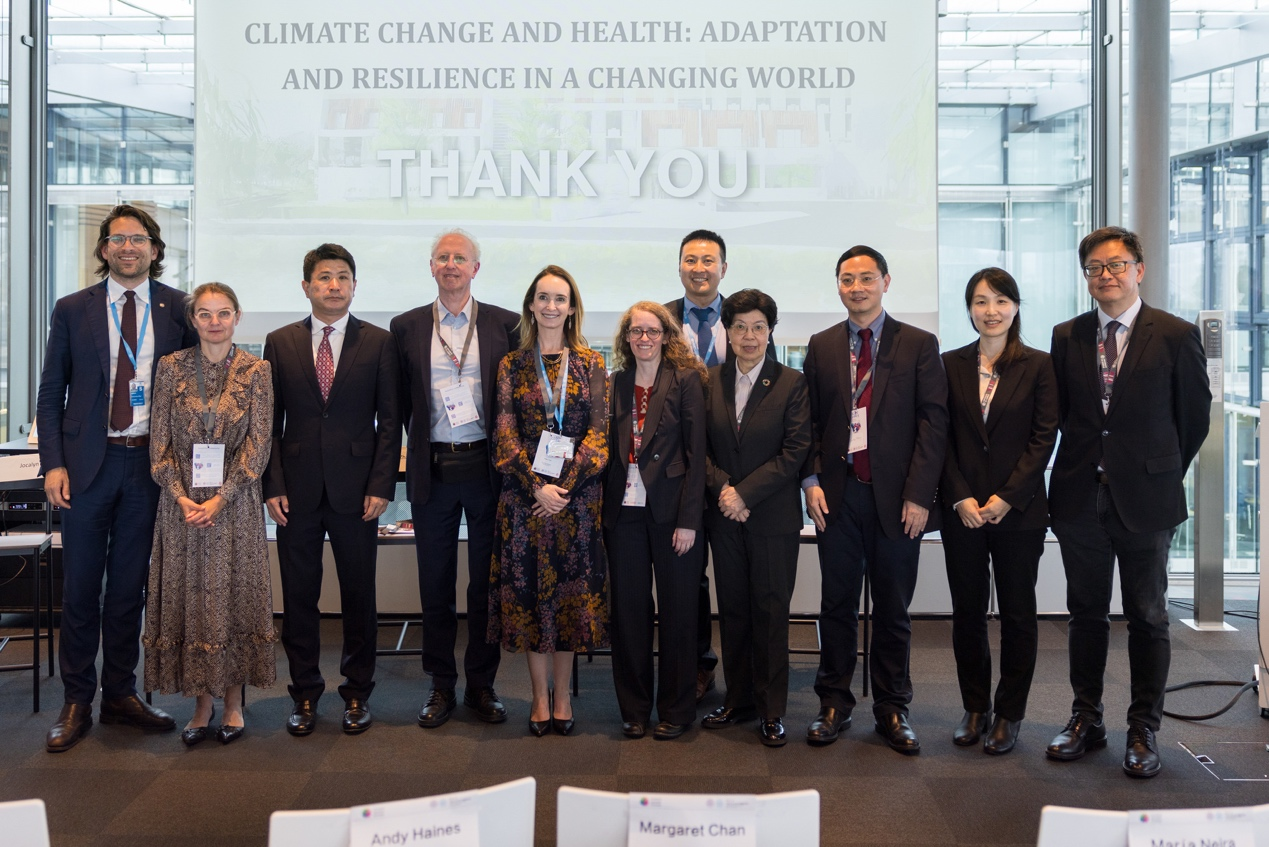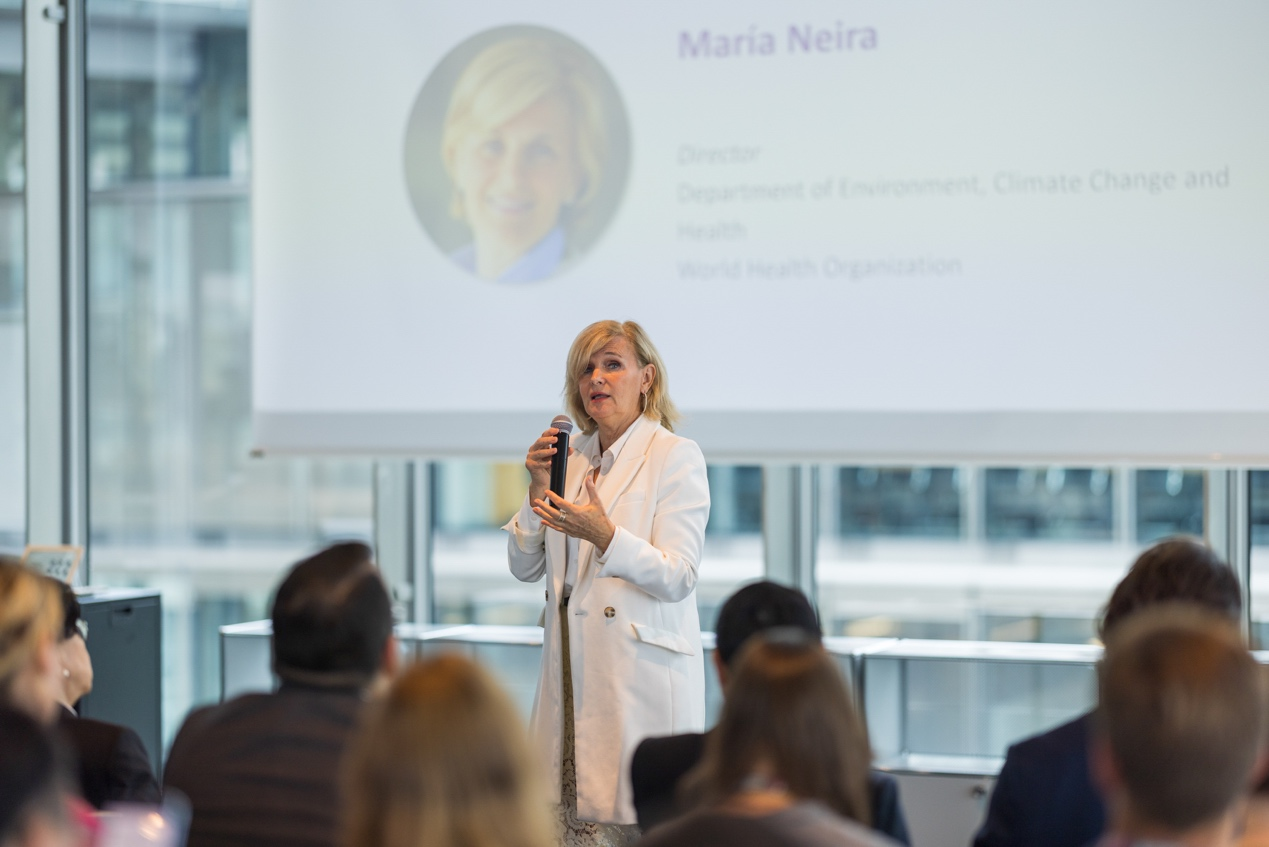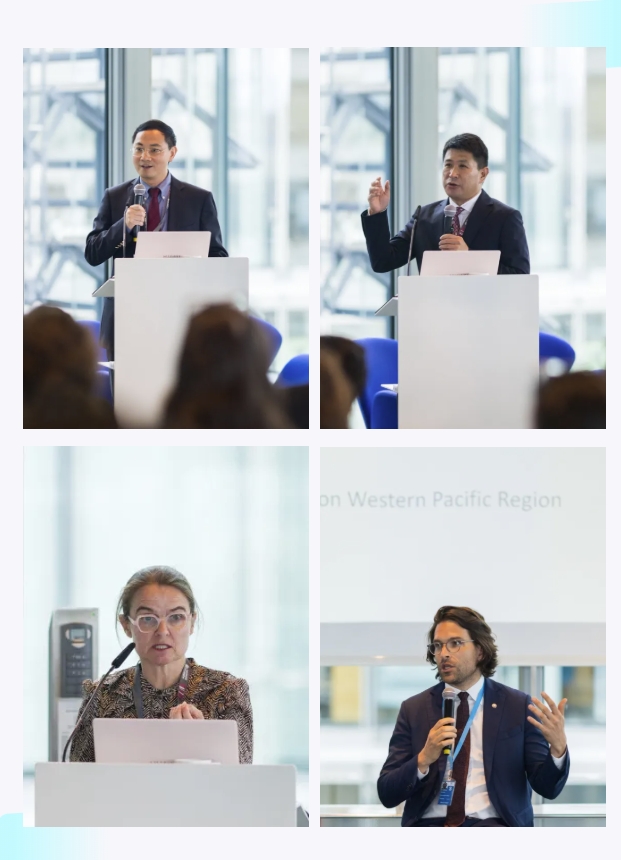On the sidelines of the 78th World Health Assembly in Geneva, the satellite symposium, Climate Change and Health: Adaptation and Resilience in a Changing World, was held in Geneva on May 21. The symposium was co-hosted by Tsinghua Vanke School of Public Health (VSPH) and the Geneva Health Forum. It brought together leading experts in climate and health, the event examined pressing challenges and actionable strategies to mitigate health risks posed by climate change, drawing over 100 attendees and sparking dynamic discussions.

Group photo of speakers and panelists
Opening Remarks
Dr. Margaret Chan, Founding Dean of VSPH and former WHO Director-General, stressed the urgency of equipping younger generations to tackle climate-related health threats in her opening address. She highlighted VSPH's initiative to develop a Chinese edition of the Planetary Health textbook to foster youth leadership, while also underscoring the need for gender equality and inclusive development in climate action. Her remarks sparked active engagement from the audience.

Dean Margaret Chan delivers opening remarks
Keynote Speech
Dr. María Neira, Director of the Department of Environment, Climate Change and Health at the World Health Organization, delivered the keynote speech. She began by showcasing China’s success in reducing air pollution while maintaining GDP growth, presenting it as a model for sustainable development. Dr. Neira outlined three key areas where climate action yields significant health benefits: transitioning to renewable energy, promoting healthy urban planning, and advancing sustainable food systems. She emphasized WHO’s ongoing initiatives, including integrating health metrics into climate negotiations—ensuring policymakers recognize that “they are not just negotiating with the percentage of emissions of green gases. They are negotiating with our life.” Additionally, she highlighted the Alliance for Transformative Action on Climate and Health (ATACH), which supports member states in decarbonizing healthcare systems. “Health can be the most powerful argument for climate action. Actually, health is the argument for climate action,” she concluded.

María Neira delivers keynote speech
Background Introduction
Associate Professor John S. Ji of VSPH provided detailed background on the significance of this meeting and reviewed the school's journey in climate change and health research. Professor Ji particularly proposed the important concept of“Health is the landing zone for climate change adaptation,” noting that unlike climate change mitigation which can be measured in CO2 equivalent tons, adaptation involves multiple dimensions and is difficult to measure. He hoped this meeting would explore how to establish a health-centered climate adaptation indicator system.

John Ji provides background introduction
The following two panel discussions were moderated by Dr. Jocalyn Clark, International Editor and Head of Scholarly Comment at the BMJ, focusing on "Current Situation Analysis" and "Future Development Pathways." Multiple scholars and experts engaged in in-depth discussion and exchange.

Jocalyn Clark moderates panel discussions
Panel Discussion I: What’s in the Moment — From Scientific Evidence to Practical Application
The first panel discussion invited Professor Andy Haines from London School of Hygiene and Tropical Medicine, Associate Professor John S. Ji from VSPH, Jessica Kronstadt from the Planetary Health Alliance, Jian Zhou from Tsinghua University Institute of Energy, Environment and Economy, and Associate Professor Yoonhee Kim from University of Tokyo to conduct in-depth analysis of the current climate change and health situation.
Professor Andy Haines first pointed out that humanity has entered unprecedented dangerous territory, with global temperatures rising above 1.5°C, and six of the nine planetary boundaries have been transgressed. These planetary boundaries include climate change, biodiversity loss, and land-system change, which interact to produce complex impacts that will accelerate irreversible damage. He emphasized that mitigation and adaptation must proceed simultaneously, and particularly called for strengthening transdisciplinary implementation science research to effectively implement climate action. Subsequently, Associate Professor Ji used satellite images to demonstrate the coexistence of increased life expectancy and urban heat island effects brought by urbanization, analyzing the potential benefits of “sponge city” solutions. Director Kronstadt emphasized comprehensive considerations from a planetary health perspective, noting that climate adaptation needs to consider biodiversity loss and other multifaceted factors, pointing out the key role of values in adaptation decision-making. Dr. Zhou shared typical cases of healthcare system decarbonization in China, demonstrating the carbon reduction potential of hospital buildings and medical equipment, and proposing carbon reduction pathway scenarios and evaluation indicators. Associate Professor Kim emphasized the importance of systematic evaluation, pointing out insufficient evidence in mental health and special barriers for populations with mental health conditions in accessing intervention facilities like cooling centers.

From left to right, top to bottom: Andy Haines, John S. Ji, Jessica Kronstadt, Zhou Jian, Yoonhee Kim
Panel Discussion II: How to go forward — Building Resilient Health Systems
The second panel discussion focused on how to continue advancing climate change health adaptation, with participants including Professor Cunrui Huang from VSPH, Vice Dean Jian Zhang from Tsinghua University Institute for Climate Change and Sustainable Development, Katherine Littler from WHO’s Global Health Ethics and Governance Unit, and Sandro Demaio from WHO Western Pacific Regional Office.
Professor Huang proposed three priorities for building climate-resilient health systems: integrating health into climate governance core, noting that the unacceptable status quo of climate health funding accounting for only 0.5% of multilateral climate funds; empowering local solutions with global science, promoting AI early warning systems and precision public health big data technologies; and strengthening transdisciplinary research while integrating health resilience into urban planning. Vice Dean Zhang emphasized the necessity of climate health literacy education. He introduced that the Global Alliance of Universities on Climate (GAUC) led by Tsinghua University has already developed climate-health education at 400 universities in 74 countries. He particularly emphasized that this year’s climate agenda priority is establishing an adaptation indicator system, noting that within the Global Goal on Adaptation (GGA) work program under the UN Climate Change Conference (COP) framework, what gets measured determines policy priorities and investment decisions. Katherine Littler emphasized the importance of climate health ethics frameworks in indicator systems, pointing out that ethical issues in climate decision-making are often overlooked. WHO is promoting climate ethics framework development and related case studies, emphasizing ethical challenges in resource allocation. Sandro Demaio shared practical opportunities for building resilient systems from a regional perspective, including three major opportunities in the Asia-Pacific region: existing successful actions, young population advantages, and WHO’s new environmental health projects being established. He also noted that climate action should not be limited to annual meetings but requires building sustained global cooperative movements.
During the interactive session, participants engaged in in-depth exchanges on multiple key issues of climate health.

From left to right, top to bottom: Huang Cunrui, Zhang Jian, Katherine Littler、Sandro Demaio
After the exciting discussion sessions, Prof. Huang summarized three key messages: climate change is not a distant threat—it is harming health now; adaptation requires innovation and equity; collaboration is non-negotiable. Additionally, he briefly introduced the upcoming Fifth World Health Forum to be hosted by Tsinghua University Vanke School of Public Health, and cordially invited all parties to participate, to continue deepening international cooperation on this important issue.
The side event provided an in-depth exploration of core issues including health indicator systems for climate adaptation, resilience-building frameworks, and ethical governance. A key emphasis was placed on integrating health considerations as a central element in climate policy-making, offering critical scientific foundations and practical pathways for advancing global climate-health governance. Through its consistent promotion of such high-level international dialogues, VSPH is accelerating the formation of a “science-policy-action” continuum to address climate-related health risks. These efforts demonstrate China’s intellectual contributions alongside global solutions to safeguard humanity's shared healthy future.